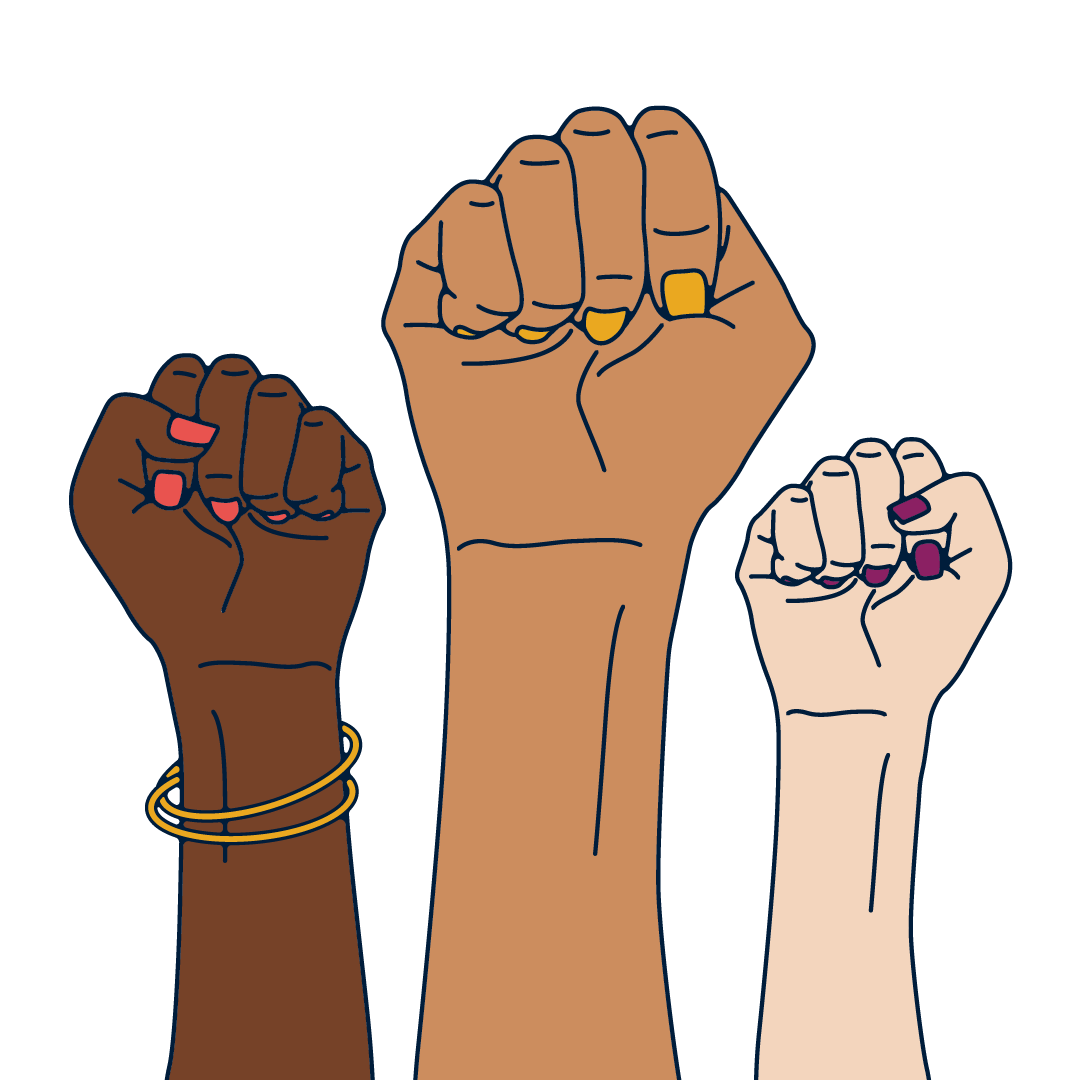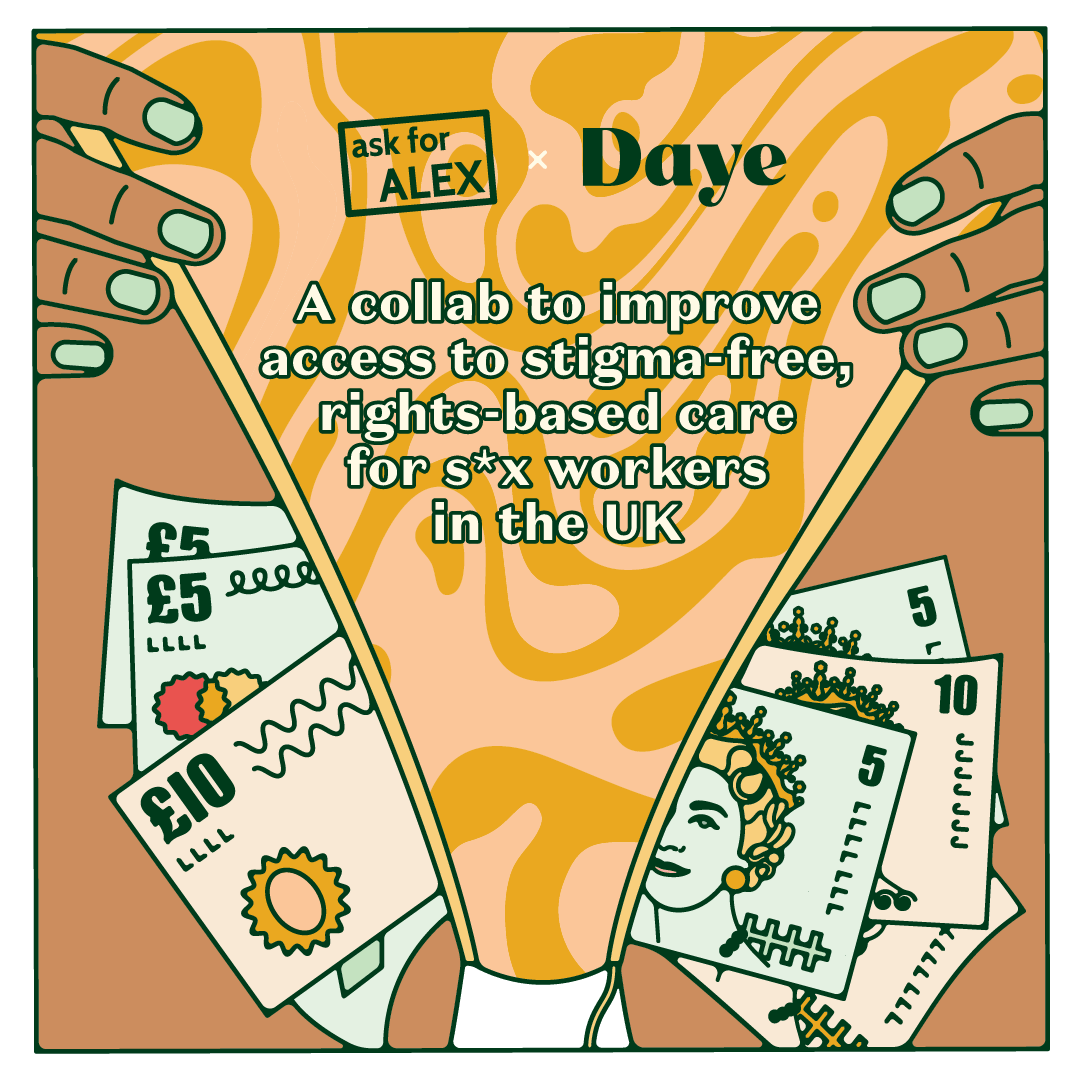Table of contents
1. What is The Alex Project?
2. What exactly does The Alex Project offer?
3. Why is the partial criminalisation of sex work so dangerous for sex workers?
4. If sex work isn’t fully decriminalised, what are the alternatives?
5. Full decriminalisation is – and has to be – the only answer
Written by Izzie Price
Illustrated by Maria Papazova
Did you know sex work isn’t actually fully decriminalised in the UK?
You’d be forgiven for doing a double take here; unless you’re familiar with the legalities surrounding the industry, you may well assume sex work is fully legal. After all, the City of London Police website reads, “The exchange of sexual services for money is legal in the UK”, with the exception of Northern Ireland. But then, it goes on to cite “related activities” that are “illegal under the Sexual Offences Act 2003” – including street-based sex work (‘soliciting’ in a public place) and multiple sex workers working on the same premises – and that’s where we start to see that, actually, sex work is not fully legal in the UK. Far from it.
The lack of full decriminalistion for sex workers in the UK means the industry is far more difficult and dangerous to navigate than it would be if it was fully legal (keep reading to find out exactly why this is); and this is just one of the many, many reasons why The ALEX Project is so desperately needed.
What is The Alex Project?

The ALEX Project was set up by sex workers, for sex workers – and it provides a variety of services, both in person and online. “It’s symbolic of the fact that, despite all the injustices we see around the world today, every day there are people fighting the good fight,” says Lara Murray, Sex Worker Services and Strategy Lead. “The ALEX Project is a good fight.”
Crucially, the first point of contact for a sex worker approaching the organisation is someone on the ALEX team who has lived experience of the industry themselves. “The ALEX Project team holds a space for our service users that is free of judgement and full of understanding, which promotes psychological safety,” Lara continues. “While our service users will still feel nervous when they approach us, at least they don’t have to go through the familiar process of masking, or bracing themselves for prejudice.”
What exactly does The Alex Project offer?
The Alex Project runs weekly drop-ins across multiple London boroughs where they offer supplies, signposting or just a chat, depending on need. There are also online wellbeing and topic sessions, covering a range of areas like nervous system regulation, self-care, and simply a space for sex workers to discuss issues specific to the industry; not to mention therapy groups (with a counsellor who has lived experience of the sex work industry), art and movement therapy, and the option for individual counselling referrals.

As if all that wasn’t enough, The ALEX Project also offers casework; this means you have an initial assessment with someone from the team and mutually agree how they’ll help you to achieve your goals (this is all confidential). You can also find password-protected resources on the website, www.askforalex.org.uk, ranging from help with stalking to interacting with police to chemsex; and you can opt to go to one of their many events or join the sex workers’ Whatsapp group.
Lara joined The Alex Project two years ago as a caseworker providing 1:1 advocacy support. “Providing that support to folks who really needed to talk to someone with similar lived experiences to themselves showed me how valuable this work is,” Lara explains. “When someone is already being oppressed by multiple overlapping risk factors and then they get hit with something like a demand from HMRC or a challenge to their disability benefits, the additional capacity and support that casework advocacy can provide them with is a real safety net.”
And, of course, The Alex Project is fighting for full decriminalisation for sex work; because everyone who works there understands the barriers sex workers face, not to mention the fear and harm that can come with aspects of the industry being criminalised.
Why is the partial criminalisation of sex work so dangerous for sex workers?
“The best way to protect workers in any sector is to give them rights and ensure they have access to help if those rights are infringed,” Lara explains. “Exploitation of all kinds of labour thrives when it is hidden, so criminalising the sex sector keeps it in the shadows. [And] in the lawless space of the shadows, crimes occur.”
Lara cites the example of brothel workers putting up with abusive treatment by management, because they fear having their pay taken away; and then having no recourse to the courts if that does happen. “Similarly, they have no health and safety rights and the premises where they work are often unsafe; but they won’t report this because their workplace would get raided and shut down, and then they would have lost their source of income,” Lara continues. “Decriminalising the sex sector would bring it out of the shadows and create space for workers to have, and enforce, rights.”
There’s also the fact that sex workers can’t work together for safety, which makes them more vulnerable to violence and abuse; and this partial criminalisation further marginalises those who are working class, who may engage in street sex work due to factors like not having financial access to a phone (or, indeed, a home).
Lara points out that the situation is even worse for migrant workers, who are at risk of being deported if they call attention to abuse or exploitation. “As for trans folks, the climate of transphobia in the UK is a bad enough atmosphere to exist in already; but imagine being a criminalised sex worker and trans, at the risk of physical assault, and feeling too fearful to report harms,” says Lara. “That is basically what criminalisation does – it makes folks more vulnerable physically, emotionally, psychologically and materially. “
Essentially, we need sex work to be fully decriminalised in the UK; but this is by no means a guarantee.
If sex work isn’t fully decriminalised, what are the alternatives?

- Legislation
This would make sex work legal, but it would be regulated by the government. This cannot be the answer – because it would mean intrusive surveillance, among other limits on sex workers’ freedom. Plus, it may well lead to a divide between legal workers and those who can’t meet those conditions; such as migrant workers, who likely wouldn’t be able to comply with a regulated system. Even those with the right to work in the UK may not be able to comply with aspects of a regulated system because of financial issues – paying for licences, for example, or imposed testing.
- Criminalisation
The clue’s in the name, here; this means making all aspects of sex work wholly illegal. This can’t be the answer either; sex work wouldn’t disappear. All that would happen is that sex workers would be far more at risk of violence, far less able to access healthcare and far more vulnerable to exploitative and dangerous working conditions.
- The Nordic model
This is what’s currently being proposed in the UK. Effectively, it means criminalising the clients and decriminalising the sex workers; but all this would do is push the work underground. Once again, it would be harder for sex workers to screen or work in safe locations, because clients may fear legal consequences if they don’t remain entirely anonymous.
“Criminalising clients of sex workers means that the clients are taking on the risk of the criminal act, which means they will want to go to isolated places and pay less money,” says Lara. “The sex workers are left with even less power to bargain with criminalised clients, and therefore less empowered to negotiate for safety, like insisting on condoms.”
Fundamentally, the Nordic model barely does anything to address the stigma around sex work – which has, historically and currently, been both constant and abundant – or the policing of it, and it would seriously limit sex workers’ abilities to organise and form safe places of work.
Full decriminalisation is – and has to be – the only answer
Full decriminalisation would enable sex workers to have freedom in where and how they work. It would make screening and safe working easier. It would improve access to healthcare and labour rights by reducing stigma and societal barriers; and it would free up the time and money of UK law enforcement to focus on actual crimes, like trafficking, violence and exploitation.
“To achieve decriminalisation in the UK, there would be a process of overturning criminal laws, [like] soliciting, and administrative or civil orders, [like] ASBOs, that harshly target outdoor work, brothels [and] advertising, [among others],” says Lara. “The laws that are designed to punish sex workers and eradicate workplaces need to be rooted out.
“A decriminalised sex sector would be one where the sale, purchase and facilitation of commercial sex is shifted out of the criminal law system and into the framework of commercial and employment law,” Lara continues. “We already have laws to protect against coercion, exploitation, bullying, assault and rape – those would continue to apply to sex workers as they do to all individuals.”
Fundamentally, full decriminalisation would mean sex workers could report violence and abuse: Regardless of the semantics of how and where they were working. Clients could also be much less likely to harm workers, due to an increased risk of being reported.

Here at Daye, we will continue to stand with The ALEX Project as they fight for full decriminalisation of sex work in the UK; and we’ll always support the invaluable work they do in offering sex workers a vital community and access to stigma-free, judgement-free care. As Lara says: “I am so glad there is funding available for us to deliver our holistic wellbeing services to sex workers. This is a small glimmer of hope that remains in a hostile environment of criminalised workplaces and many everyday hurdles to running a business that most other people will never encounter in their lives.”
To find out more about The ALEX Project, follow them on Instagram (@ask4.alex), TikTok (@the_alex_project) and/or Bluesky (@askforalex.bsky.social)






